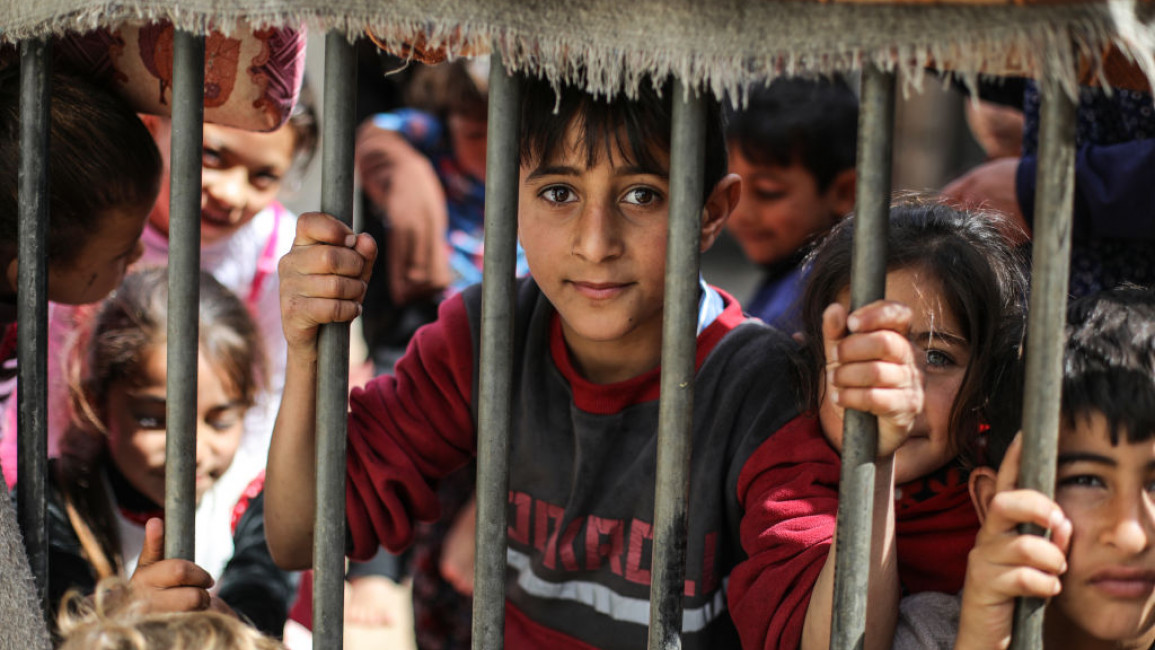New taxes on imported goods in Gaza by Hamas provokes anger from residents, merchants
New taxes by the Hamas-run government in Gaza on several imported goods provoked anger and criticism from residents and businesses, who say that this will exacerbate the difficult living conditions in the besieged coastal enclave.
In a press statement sent to The New Arab, the Hamas-run economy ministry said that they have "issued about $US 3 taxes on every piece of pair of jeans and Islamic women's Jilbab imported from abroad."
In addition, there will be a $US 300 tax per ton of nylon and a $US 60 tax on each ton of juice, said the ministry's statement.
It also noted that the new taxes come into force this August.
"Imposing the new taxes aims to support the local product in Gaza, mainly as the local factories in the coastal enclave produce alternative products to imported goods," the ministry said of the reasons behind the decision.
How Gaza's water crisis is creating a humanitarian disaster ⬇ https://t.co/Va5TMUj56T
— The New Arab (@The_NewArab) December 6, 2021
Therefore the ministry seeks to increase market share, ensure the competitiveness of local goods against imported goods and expand the number of industrial establishments and factories to reduce the unemployment crisis in Gaza, the statement added.
"Imposing new controversial taxes will negatively affect merchants and local customers as the prices of imported goods will significantly increase in the impoverished coastal enclave," Hosni al-Shrafi, a Gaza-based director of an import company, told The New Arab.
"I was shocked when the ministry informed me of its new decision, mainly as the new taxes will be added to others taxes already in place on the same goods," he said.
"Issuing such a decision will incur huge financial losses for traders, who are already suffering from the recession in local markets resulting from the high poverty rates and unemployment among locals."
"We suffer a lot in the Gaza Strip. In the past the importation process was easy since taxes went to one party. But today, we pay taxes to three parties: Israel, the Palestinian Authority, and Hamas," he added.
Another challenge for al-Shrafi and his fellow business owners was the ministry's requirement of a prior import permit before starting the procedures to import his goods.
Similarly, several of Gaza's residents expressed anger against the new taxes, calling on the Hamas-run local authorities to reverse the decision.
"It seems that Hamas lives in a country other not in Gaza (...) it is masterful in imposing taxes on merchants, who in turn increase the prices of goods without caring about the people who live under the poverty," Amir Hashem, a Gaza-based unemployed resident, said to The New Arab.
"Because of Hamas' irrational policies, whether economic or political, we have been living in catastrophic conditions for years," the 45-year-old father of four said.
Hashem cannot keep his family afloat, and the new policies will make his situation worse.
An unliveable life: Surges in unemployment, population threaten to paralyse Gazahttps://t.co/tRHqy6cpey
— The New Arab (@The_NewArab) July 20, 2022
"Because of Hamas' continued imposition of taxes, we are suffering from an unparalleled high cost of living, while citizens cannot provide for their minimum daily needs," Lara al-Naji, another Gaza-based resident and a mother of five children, said.
She thinks rather than taxes, Hamas' government should be investing millions of dollars it obtained from donor countries in economic projects that contribute to the development of the local economy.
In 2006, Israel imposed a blockade on the coastal enclave after Hamas won a general election in the territory.
Their electoral success resulted in clashes with rivals from Fatah, the movement that runs the Palestinian Authority (PA).
Israel tightened its blockade on the Gaza Strip after Hamas forcibly took over the territory from Fatah in 2007.
Because of the Israeli blockade, about 1.5 million Gazans have become impoverished, according to a report issued by the Euro-Mediterranean Human Rights Monitor in January.



